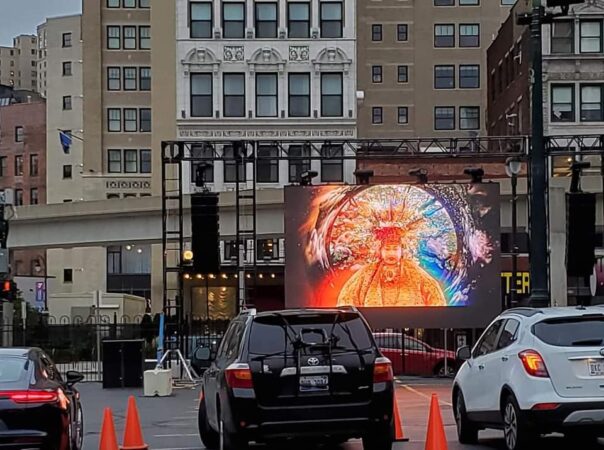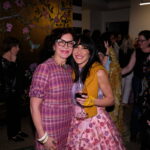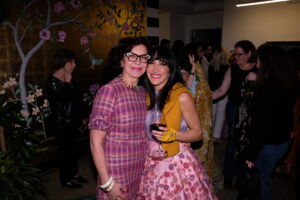2020 was a knock-down year. Covid-19 surged through the country and still continues to lock its hold on us. The arts community has been ravaged both in ticket sales and jobs. Times of extreme stress can bring out the toughest in us and at times like this, it is said that ultimately, creativity reigns supreme. This is exactly what happened towards the end of October last year when the Michigan Opera Theater, in Detroit, staged a whirlwind of a take on the production of Wagner’s Twilight of the Gods opera, in a parking garage. Yes keeping social distancing at the forefront, and yes realizing a nip was turning in the air, and yes not knowing the public’s response to how the unique production would be received. None of this stopped the newly transplanted wunderkind of the MOT, Yuval Sharon, from pulling the magical production together. Detroit was in high spirits, international stars were part of the cast, the best of the city’s talent was as well, and all told, the global press loved it.
DII has the exclusive on the behind-the-scenes from Detroit poet Marsha Music, what her experience was like as part of the cast during pre-production, and how she focused on the work at hand.
Last spring, weeks into the lockdown, I was instructed to return to work – in person. I was grateful for my 29 years on the job in the courts (my second career, in fact), but I was weary and distressed, what with the specter of Covid-19. I was awarded a prestigious Kresge Fellowship in the Literary Arts, in 2012, and my pursuits in the arts community had increased exponentially. Juggling all of this – at 66 – I wanted to leave my “day job – but letting go was not easy.
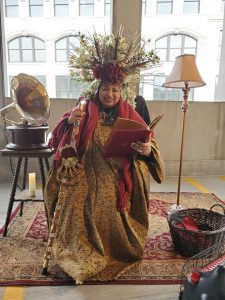
MARSHA MUSIC ON SET
My youngest son, in California, watched my weariness from afar. He urged, “Ma, time to retire! Something else is waiting for you.” Finally, in the summer, I filed to leave the courts. Two days later my phone rang – it was Gary Wasserman, owner of the Wasserman Gallery in Eastern Market; a welcome voice.
I’d read my poetry at his gallery events and he is a patron and board member of the Michigan Opera Theatre; he wanted to interest me in a project. An opera. In a parking garage. Now, I’m a writer and poet; I’ve done some exciting projects, and I’ve been to the opera many times. But I’d never dreamed I’d be in an opera. In a parking garage.
Wasserman explained that Yuval Sharon, of Los Angeles, was the new, young artistic director of MOT. The position had been unfilled since the death of the esteemed David DiChiera, the man who was responsible for the 1996 restoration of the Opera House. Soon Yuval and I met in my living room, masked and social distanced. He was head of a progressive opera company and had produced dynamic, new operas – challenging the customary, often colonialist repertoires, and was staging outdoor performances that spanned L.A.. He is unpretentious, energetic, and brilliant – he had been a recipient of a MacArthur Genius grant.
We got along immediately. Although MOT had long been a pioneer in “colorblind” casting – and in fact, the long-time Director and CEO Wayne Brown, is an African-American Detroiter – Yuval envisioned greater diversity of opera audiences and stories, too. He shared his vision of MOT continuing to adapt to modern times, and more engagement with Detroiters – even if a German opera might be a curious way to start. He wanted to lead with a new iteration of Gotterdammerung – Twilight of the Gods – the last segment of a four-part, 15-hour-long behemoth by Wagner, called The Ring Cycle.
For his uber-abbreviated, one-hour version, called Twilight: Gods, Yuval had crafted a part for me as Erda, “a Goddess, Mother of the Earth.” This was a somewhat revisionist casting, as she doesn’t even appear in the last segment of the original four operas. In addition to being the new artistic director, and heading the production, Yuval – in true wunderkind fashion – had translated the German libretto into English. But he also wanted a narrator to tell the story; he and Wasserman both told me that I was their only choice. I was astonished and humbled by their confidence in my work. I signed on, and the end of summer was a blur of preparations – to retire from work, and start with the opera.
Due to the pandemic, there could be no live inside-theatre performances with a full audience. Yuval and Mr. Brown had inventoried the physical assets of MOT, and Mr. Brown suggested the parking garage as a possible performance space. By the time I came aboard, preparations had begun to transform it into a venue.
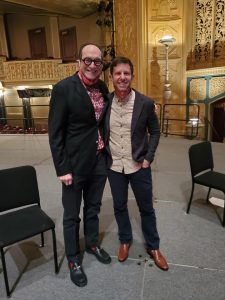
GARY WASSERMAN OWNER OF WASSERMAN GALLERY AND ARTISTIC DIRECTOR YUVAL SHARON
I had never seen Wagner performed at the Opera House (MOT has rarely staged Wagner), but I was familiar with the glorious, bombastic music from movies (say, Apocalypse Now) and in popular culture – even the racist film, Birth of a Nation. The Lord of the Rings stories were said to be based on Twilight of the Gods, a convoluted tale of a magic ring coveted by gods, goddesses, and mortals – full of great love, drama, and mayhem.
I knew about the controversy over the Nazi’s co-optation of Wagner’s music and imagery, and his odious antisemitism. I began reading a new book by the New Yorker music critic Alex Ross, in which he exhaustively detailed the much wider-ranging roots of Wagner’s music than that of the fascists; even the composer’s little-known left-wing origins. I sought rationale in the fact that the late Justice Ruth Bader Ginsberg had declared that Twilight of the Gods was her favorite opera. Yuval is Jewish, born in Israel; the international devotees of Wagner – who separate the music from the mess – are legion.
I went on a Gotterdammerung deep-dive – I fell in love with the music; melodic, grandiose, and “extra,” as the young folks say. I read texts from the canon of Wagnerian studies, and with Yuval, I navigated through the complex story. But soon, totally confused by the convoluted entanglements therein, I asked MOT Director of Education, Andrea Scobie, for a visual family tree, which finally helped me to unravel the complicated familial saga – I had to see it.
I wrapped my mind around the complicated tale of the whole Ring Cycle until it distilled into real-life experience: the deceptions, weaknesses, and avarice of a dysfunctional family – and the one who comes to break the generational curse. Just like in life. My own even. Re-creating the mayhem of the gods in collapse, as an allegory for today’s mayhem and plague, was my task. Yuval insisted that he wanted the story told in my “Detroit voice,” which I took to mean not just my vernacular, but my “take” on the story – in rhyme, no less.
By mid-September, not only did we have just four weeks until the run began, but my deadline for the narration was even sooner – to be recorded two weeks before the October 17th opening. I kept writing, day and night. Yuval and I wrangled with my stanzas on Facetime and phone, and I read and re-read my narration; I submitted fourteen pages of poetry.
On October 1, it was time to record. Inside the Opera House, the empty seats in the theatre were a sober reminder of Covid-19’s impact on venues worldwide. At first, my reading – with veteran Opera House soundman Henry doing the recording – was restrained, tentative; I wanted to sound “Detroit” – but not sitcom jivey. Yuval wanted to hear more “Marsha Music.” A lot more.
I finally understood that my character, Erda, would not just be an off-stage narrator, but a central figure – my voice heard from the moment the cars arrive, until after the roof-top finale. I began to put some gumption (as my mother would say), into the narration. Yuval just wanted me to be me. During the reading, he decided that he wanted the audience to not just hear me, then watch me read live mid-show, but see me as soon as they arrive. So, since I couldn’t be on a middle floor of the parking garage, and at the outside entrance at the same time, a video shoot was planned, too -my moving image would greet the audience.
Though much abbreviated from the original, this opera was not just some quirky project – this was an opera for real. In mid-October, before the full-dress rehearsal, for the first time I go onto the “stage;” the seven-floor parking garage, in the block south of the Opera House. I’m nervous – afraid of heights and winding around parking garages in a car – good thing I’m walking. It’s a big, cavernous cement space, virtually empty but for a few production staff. It was hard to see how all of this would come together but Yuval was all smiles – and, as always, laser-focused.
Producing an opera in a parking garage – in a pandemic – is a daunting enterprise. The structure is a “double helix,” parking on both sides, winding up, then back down. The admission was per carload; the audience was to arrive and remain in their cars, moving from the outdoor lot adjacent to the Opera House, and up through the parking structure across the street.
Then there was the matter of sound – scenes would be staged on each floor at the same time. So that the audiences wouldn’t hear music from the floors above and below, each row of eight to ten cars would be instructed to tune their radios into a different frequency on each floor, to play the sounds and music of each scene.
On October 15, there’s a full-dress rehearsal with an audience; I could hear the electrifying voice of soprano Christine Goerke – the heroine Bruennhilde – as she warmed up in her dressing room next to mine. I never saw the other singers perform, as we were separated by garage floors and social distance. The cast is diverse; in fact, most of the production’s singers were Black and POC. I thought about my parents, who’d spent many an evening in the nightclubs in Paradise Valley – across the street, back in the day; here I was in a dressing room, preparing for an opera.
There’s a great costume department, but I’d made my own – a majestic, chartreuse garment – not unlike my usual dramatic garb – and I’d commissioned a spectacular floral headpiece for an earth goddess vibe, created by designer Nneka Jackson. I wanted to step onstage like the late, great opera singer, Jessye Norman – even in a garage.
October 17. It’s Opening Day; instead of “break a leg,” the opera folks say, “Toi toi toi!” The excitement is palpable; in the midst of the lockdown, people are ecstatic to be at the opera – or any event. CEO Brown and Yuval greet each carload of folks through their closed windows as they arrive. Even though a performance was added to the three scheduled shows, ticket demand was so great that many were left disappointed; this show can’t accommodate the customary theatre audience, only carloads per timed slot.
The parking garage was a hive of brainiacs, logistics, and sounds. Arriving cars were staged at the outdoor lot, and as I was golf-carted to the garage, I was stunned to see my own digitalized, fantastical image on giant screens, speaking my opening lines:
I am Erda, Mother of Earth
An oracle – a queen – for what it’s worth
I know past and future ‘cause I’m clairvoyant
I’m primordial, mystical – and a little flamboyant
The temperatures dipped and each day was colder when I arrived, and I’m given a floor heater, shawl, hand-warmers, thermal garb. The cars, by group, enter on the ground floor outdoor lot, in front of my huge talking head. Ushered along by guides, they inch along into the parking garage and spiral upward, floor by floor, to the sound of my recorded voice. The audience stops at each scene, watching singers Morris Robinson as Hagen, Donnie Ray Albert as Alberich, Catherine Martin as Waltraute, and Sean Panniker as the anti-hero Siegfried – international opera stars – right outside their car windows.
On the fifth floor, I read my lines from my earth-mother rocking-chair, on an oriental rug next to an old lamp and a victrola – a sort of timeless tableaux. Twelve times an evening an approaching bank of headlights was my cue that another cycle had begun, and after each time I read I couldn’t help but break character and wave at the grown folks and kids, who waved at me and thumbs-upped as they passed.
Then the cars turn the corner, on their way to the seventh, rooftop level, for the spectacular finale. There, open to the sky, ruined cars and smoke evoke a dystopian Motor City/Valhalla. Passersby on the downtown streets below can hear Goerke/Bruennhilde and her bold, crystalline soprano, blocks away. As the cars exit down and out, my recorded voice declared:
And generations bound and trussed
Be loosed and freed and lifted thus
The twilight of old gods is soon
The time of Gotterdammerung
On the morning of the second show, I wake up, my bedroom spinning – a terrifying attack of vertigo. I creep gingerly through my home – I’m afraid to walk, let alone drive. My doctor prescribes meds, my eldest son Akki cooks and gives me encouragement, and my youngest, Joe, in town for the show, drives me to the next performance and back. At the garage, assistants – among the many production staffers ecstatic to be working again – hold my arm as I walk onto the set. I now know the true meaning of ‘The Show Must Go On.’
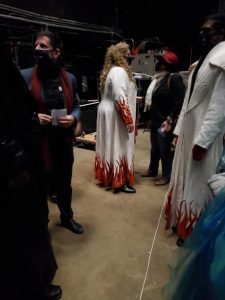
YUVAL SHARON, LEFT AND CHRISTINE GOERKE, CENTER, BACKSTAGE CLOSING NIGHT
Gradually, my head settles down and I attribute the spin to the stress to a week of extreme busyness – a press conference introducing the show and Yuval Sharon to Detroit, a Zoom promotional podcast, a tech rehearsal, dress rehearsal, video shoot, Zoom pre-show meeting, an in-person advisory meeting, running around for flu and Covid-19 tests (required for cast and staff), and my frenzied calls – while driving to and from the Opera House – ironing out retirement benefits and plus ones (especially for my 93-year-old Aunt Lil). But I loved every minute of it.
Instead of a full orchestra, there are small ensembles. The Rheinmaidens – water nymphs guarding, then losing, the golden ring – are embodied by three glorious singers – Avery Boettcher, Olivia Johnson, Kaswanna Kanyinda – the latter two, young, brown sistas. Most of the music is traditional Wagner, arranged and conducted by Ed Windels, but the illustrious funeral march was led by a real hearse, with music reinvented, by Lewis Pesacov, into a Motownesque, Detroit bop. The moment I heard it I knew the show was going to be lit.
In the breaks between intervals of each group of cars, I sat on the rocker reading a book from the prop room. I was anxious and cold, but the staff made sure I was fine. During intermission, a friend, Detroit dancer Biba Bell, emerged like a sylph from the smokey corridor to say hello, a familiar face. Each performance cycle she and her WSU troupe performed a vigorous dance during the funeral scene, to the cool, Pesacov bop. It played a dozen times an evening, for a rehearsal and four shows – sixty times – and I never tired of it. I envisioned a Detroit ballroom step to the beat, each time.
Each group of cars stopped in front of me, where I sat reading my poem. The stanzas evoked our real-life perilous days and, at Yuval’s urging, I sang a riff of the old gospel song, I’ll Fly Away – our on-the-spot idea to fill a few empty minutes each circuit. The cars drove past me to the rooftop and Goerke/Bruennhilde took flight, smoothly driven a dozen times a night by MOT’s Director of External Affairs, Arthur White, in a Detroit proxy for a magnificent mare – a Ford Mustang.
Though I was afraid that cars would bang into each other, through the entire run there were no major snafus, only an intermittent rain during the third show, when the rooftop scene had to be shifted backward, into the garage – the first time I could really hear Goerke. I knew then why she is one of the preeminent singers of Bruennhilde – in the cold, in the rain, in a cement parking garage, she bounded about, her voice on fire.
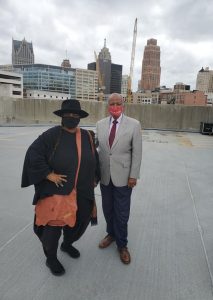
MARSHA MUSIC & MOT PRESIDENT AND CEO WAYNE BROWN
It was exhilarating and exhausting. During the last two performances, free tickets were offered to showings of a video that had been filmed of the prior performances; although the audience was limited to ensure social distance. Some – like Aunt Lil, who saw both – said they liked the video as much as the live show.
The full cast was invited onstage for a curtain call, and we all saw one another for the first time. But for generous gift baskets from MOT, Covid-19 protocols eliminated all post-performance celebration – no after-show cast parties, no toasts, no post-performance afterglows – and no hugs. We were affirmed by our labors alone, grateful for the applause of the video audience, and the congratulatory words of Wayne Brown, Gary Wasserman, and Yuval Sharon. In a city beset by Covid-19 and loss – for me, that was more than enough.
Twilight: Gods was a realization of dreams – the dream of staging an opera during a pandemic – the dream that Covid-19 be not the end of art; the dream of seeing an opera for the first time; the dream of Gotterdammerung in a Black, urban vernacular. The dream of affirming, once again, Detroit as a cornerstone of creativity. For me, writing for and performing in an opera, and becoming a part of the MOT family, were dreams come true – dreams I didn’t know I’d had.
My son was right – there was something waiting for me.


